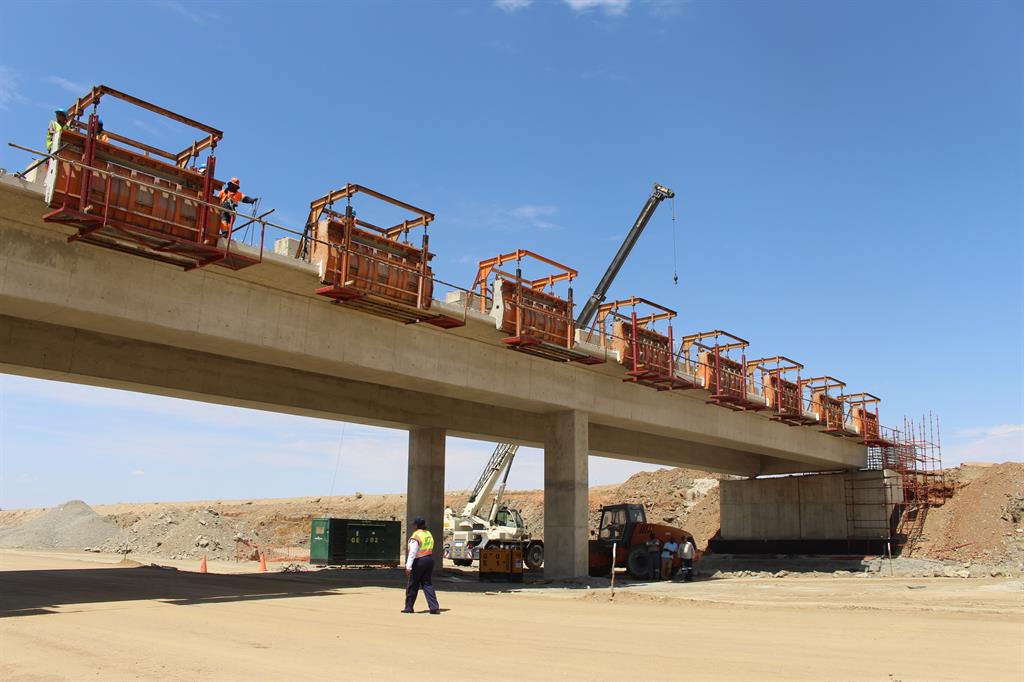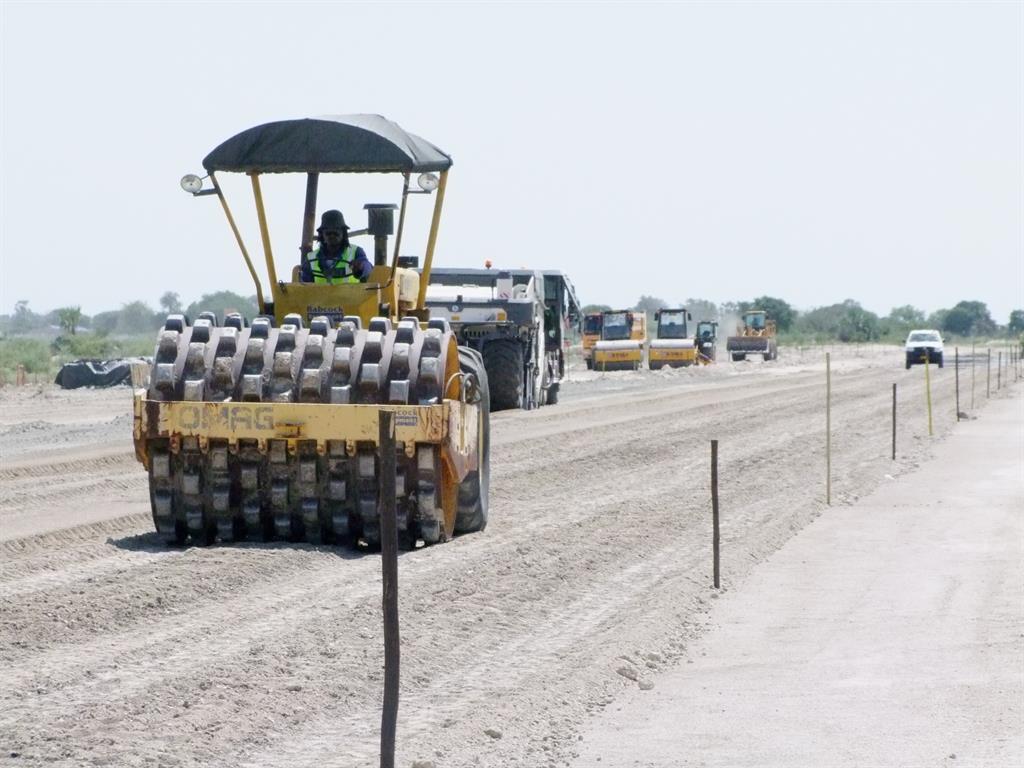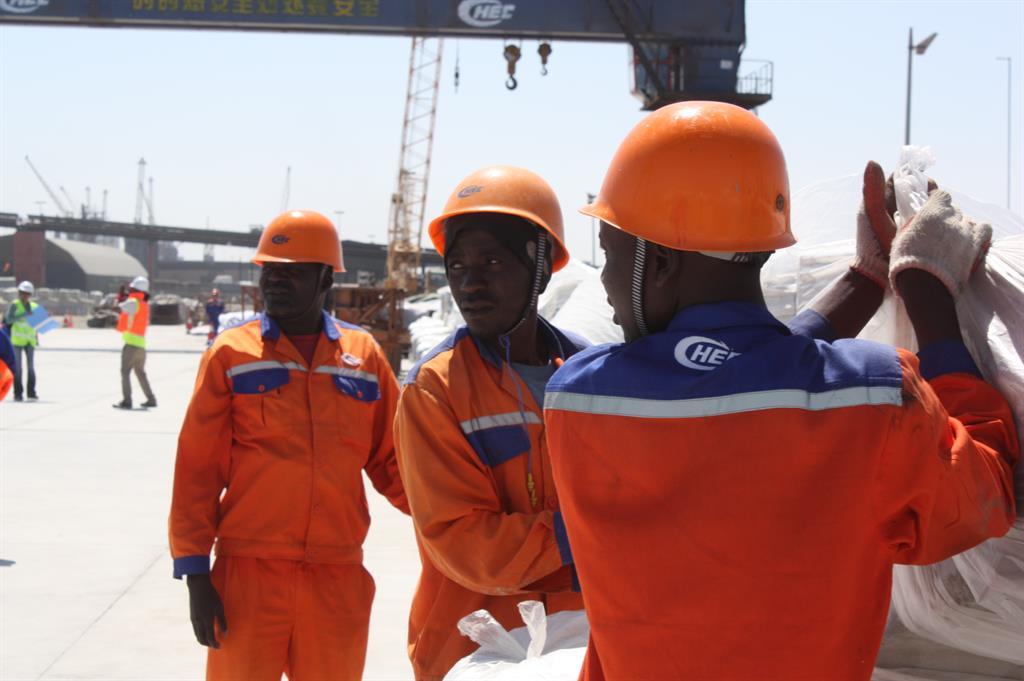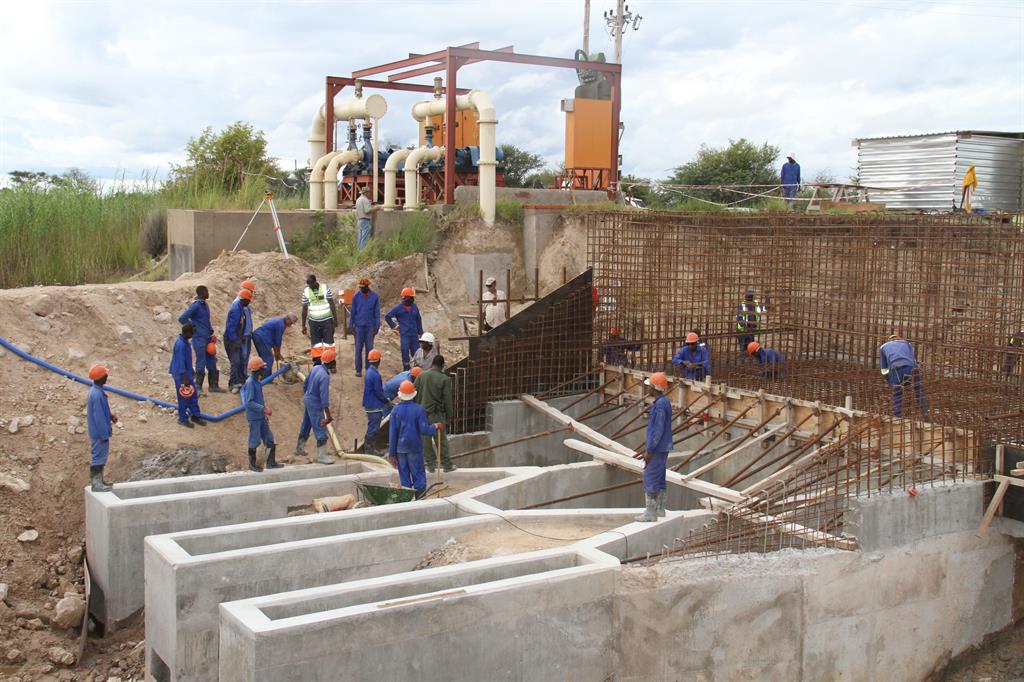Construction can be high-riser again
The construction sector potentially has a huge multiplier effect, meaning the more work locals get, the more income they can generate, the more people can be employed and more livelihoods of Namibians can improve.
Jo-Maré Duddy – The right approach by especially government can ensure than Namibia’s construction sector can once again be booming, create jobs and become a major contributor to the economy.
Opportunities for the sector are wide-ranging, from large players to SMEs, says the consulting general manager of the Construction Industries Federation of Namibia (CIF), Bärbel Kirchner.
The sector potentially has a huge multiplier effect, meaning the more work it gets, the more income it can generate, the more people it can employ and the more livelihoods of Namibians it can improve.
But then local companies must be “actively engaged”, Kirchner stresses.
“It would truly only be of benefit to the Namibian economy if local contractors are actively and deliberately engaged in all construction projects. This will ensure that people will get employed, that our businesses can be productive and that money remains in Namibia,” she says.
Crumbling pillar
In its heyday, construction employed about 60 000 people in the formal and informal sector. The sector contributed about 7.9% to Namibia’s gross domestic product (GDP).
Due to the prolonged recession this figure dwindled to about 2.9% by the end of 2019. Employment in the formal and informal sector halved to about 30 000, Kirchner says.
These already scary numbers were before the lockdown and the ongoing impact of the Covid-19 pandemic.
“The industry has seen tremendous losses, which has led to large-scale downsizing of companies, voluntary closures, as well as bankruptcies. This of course had also led to large-scale retrenchments and therefore an increasing dependency on the state,” Kirchner says.
She describes this situation as “very dangerous”.
“It can lead to a serious loss in capacity within the industry, with resulting massive opportunity costs. It can lead to the migration of skills – this is extremely costly for any country, and should be avoided at all costs, if we do not want to see our industry collapse entirely and increase our dependency on external service providers and countries,” Kirchner warns.
‘Concerted effort’
To ensure that construction again becomes a catalyst for growth, “concerted collaborative efforts” between government and the private are vital, Kirchner emphasises. Just as crucial is a “very targeted stimulus package, more than currently is being offered”.
“It is absolutely vital that government focusses on the construction sector and supports local businesses to get through this currently extremely difficult time to prevent the total collapse of the industry,” she says.
It is important that Namibia starts focusing on an optimal development of the construction sector, whereby all contractors can participate, Kirchner adds.
“We need to engage the local capacities to largest extent possible, as local contractors have the capacity to handle almost any project.”
She continues: “There must be concerted action to ensure that procurement is regulated in such a way, so that all contracts are directly awarded to the Namibian-owned companies. This will lead to the necessary multiplier effect needed to kick-start Namibia’s economy.”
Opportunities
Kirchner points out that as Namibia is a developing country, the scope for development “enormous”.
The country needs more schools, classrooms, hostels and sanitation. It requires hospitals, clinics, health centres and the upgrading of various facilities. The massive backlog in housing and land-servicing is another necessity. Building roads and maintaining the infrastructure are critical. Agriculture needs water supply to the rural communities.
“The opportunity for the construction sector is therefore wide-ranging, also considering that the total development budget was announced at a level of N$6.4 billion, which is 8.4% more than the previous year,” Kirchner says.
The opportunities within the construction sector however would solely materialise if the country does not experience repeated lock-downs in order to contain Covid-19, and if available government funds are not reallocated in order to virus-related expenditure, she adds.
Private sector
Kirchner concedes that the construction sector traditionally was very dependent on public procurement and projects by government.
“Obviously, with limited public finances being available and the continued need to curtail expenditure, the new approach of public-private partnership might create some scope for additional financing.”
However, it still would be required that both government and private sector financiers come to the party, she says.
“The scope of government’s involvement will remain limited due to ongoing budgetary constraints; the scope of private sector desire to participate, will depend on the public policy environment,” Kirchner says.
Tight budgets will “seriously curtail” government’s ability to create new jobs. It is therefore “critical” that the private sector plays an increasing role.
“However, it would be equally important that relevant policies and legislation are of such a nature that investors, both domestic and internal, are willing to invest,” Kirchner says.
An environment that creates more certainty and incentives for potential investors is “very important”, she reiterates.
Pressing issues that need to be address includes empowerment and investment promotion legislation and policies.
Stubborn barriers
Kirchner says currently anyone can practically participate in the public procurement process which is mostly regulated by the Procurement Act of 2015. “Under certain thresholds, respective authorities can advertise and adjudicate their own tenders, mostly in the region of below N$30 to N$35 million. Anything above that threshold, unless it is exempted, is handled by the Central Procurement Board.”
Foreign financiers essentially determines the procurement process. “Their requirements are often so high that local contractors cannot compete, simply based on the prequalification requirements,” Kirchner explains.
“In other instances, like when financing is availed from the Republic of China, there seem to be conditions attached, irrespective of whether the financing is a grant or a loan.
“These conditions are not in favour of the local industry; and in fact have a detrimental effect, considering Namibia’s increasing long-term financial obligations and therefore dependency,” she says.
Most of the tenders advertised are based on the process of “open national bidding”, Kirchner continues. Joint ventures with a minimum of 51% Namibian ownership can become eligible.
According to Kirchner, this leads to many transactions where agents or middleman, or so-called tenderpreneurs, get tenders awarded, despite not having any experience or capacity.
In addition, procurement thresholds are currently not suitably defined.
One can find large-size contractors, including foreign contractors, operating in the sphere where SMEs should conduct their business.
“This leads to totally unfair competition and the exclusion of the SMEs,” she says.
“The sad reality is that whilst the focus is on entrepreneurship and SME development, so many of those businesses have closed down. And we know that it takes guts to start a business, and it takes even more guts to get back on your feet, when you have lost everything, like many contractors have,” Kirchner continues.
Regulation
The CIF has been lobbying for a Namibian Construction Council to regulate the sector.
“In an unregulated environment, anyone can open a construction business. This is of huge risk to the industry. Any contractor can operate without being registered or without having their capacity being established. This can lead to poor quality work,” Kitchner says.
She continues: “The CIF currently categorises its members and contractors are also required to adhere to a Code of Conduct. However, membership of the CIF is on a voluntary basis, therefore not all contractors are members of the CIF. Since the CIF is not a statutory body, it is also not mandated to police and monitors those contractors.”
She says the industry is often accused by government authorities that the work is either of poor quality or that sites have been abandoned without projects being completed.
“This can be prevented if there was a regulated environment, and contractors would be categorised based on previous work completed,” Kirchner says.
Government has committed themselves to table and pass the bill for the establishment of a Namibian Construction Council before the end of the financial year; i.e. before 31 March 2020.
The CIF believes it is critical that key government ministries engage the federation to find a solution to create work in the construction sector.
“We have reputable large-size contractors that can co-ordinate and professionally deliver on requirements and meet deadlines in conjunctions with many subcontractors in the industry. With the high levels of unemployment Namibia is facing at the moment, and ongoing retrenchment, there must simply be a way to find a solution and to find a way forward.
“This is common sense. If that prevails, we will succeed,” Kitchner concludes.
Opportunities for the sector are wide-ranging, from large players to SMEs, says the consulting general manager of the Construction Industries Federation of Namibia (CIF), Bärbel Kirchner.
The sector potentially has a huge multiplier effect, meaning the more work it gets, the more income it can generate, the more people it can employ and the more livelihoods of Namibians it can improve.
But then local companies must be “actively engaged”, Kirchner stresses.
“It would truly only be of benefit to the Namibian economy if local contractors are actively and deliberately engaged in all construction projects. This will ensure that people will get employed, that our businesses can be productive and that money remains in Namibia,” she says.
Crumbling pillar
In its heyday, construction employed about 60 000 people in the formal and informal sector. The sector contributed about 7.9% to Namibia’s gross domestic product (GDP).
Due to the prolonged recession this figure dwindled to about 2.9% by the end of 2019. Employment in the formal and informal sector halved to about 30 000, Kirchner says.
These already scary numbers were before the lockdown and the ongoing impact of the Covid-19 pandemic.
“The industry has seen tremendous losses, which has led to large-scale downsizing of companies, voluntary closures, as well as bankruptcies. This of course had also led to large-scale retrenchments and therefore an increasing dependency on the state,” Kirchner says.
She describes this situation as “very dangerous”.
“It can lead to a serious loss in capacity within the industry, with resulting massive opportunity costs. It can lead to the migration of skills – this is extremely costly for any country, and should be avoided at all costs, if we do not want to see our industry collapse entirely and increase our dependency on external service providers and countries,” Kirchner warns.
‘Concerted effort’
To ensure that construction again becomes a catalyst for growth, “concerted collaborative efforts” between government and the private are vital, Kirchner emphasises. Just as crucial is a “very targeted stimulus package, more than currently is being offered”.
“It is absolutely vital that government focusses on the construction sector and supports local businesses to get through this currently extremely difficult time to prevent the total collapse of the industry,” she says.
It is important that Namibia starts focusing on an optimal development of the construction sector, whereby all contractors can participate, Kirchner adds.
“We need to engage the local capacities to largest extent possible, as local contractors have the capacity to handle almost any project.”
She continues: “There must be concerted action to ensure that procurement is regulated in such a way, so that all contracts are directly awarded to the Namibian-owned companies. This will lead to the necessary multiplier effect needed to kick-start Namibia’s economy.”
Opportunities
Kirchner points out that as Namibia is a developing country, the scope for development “enormous”.
The country needs more schools, classrooms, hostels and sanitation. It requires hospitals, clinics, health centres and the upgrading of various facilities. The massive backlog in housing and land-servicing is another necessity. Building roads and maintaining the infrastructure are critical. Agriculture needs water supply to the rural communities.
“The opportunity for the construction sector is therefore wide-ranging, also considering that the total development budget was announced at a level of N$6.4 billion, which is 8.4% more than the previous year,” Kirchner says.
The opportunities within the construction sector however would solely materialise if the country does not experience repeated lock-downs in order to contain Covid-19, and if available government funds are not reallocated in order to virus-related expenditure, she adds.
Private sector
Kirchner concedes that the construction sector traditionally was very dependent on public procurement and projects by government.
“Obviously, with limited public finances being available and the continued need to curtail expenditure, the new approach of public-private partnership might create some scope for additional financing.”
However, it still would be required that both government and private sector financiers come to the party, she says.
“The scope of government’s involvement will remain limited due to ongoing budgetary constraints; the scope of private sector desire to participate, will depend on the public policy environment,” Kirchner says.
Tight budgets will “seriously curtail” government’s ability to create new jobs. It is therefore “critical” that the private sector plays an increasing role.
“However, it would be equally important that relevant policies and legislation are of such a nature that investors, both domestic and internal, are willing to invest,” Kirchner says.
An environment that creates more certainty and incentives for potential investors is “very important”, she reiterates.
Pressing issues that need to be address includes empowerment and investment promotion legislation and policies.
Stubborn barriers
Kirchner says currently anyone can practically participate in the public procurement process which is mostly regulated by the Procurement Act of 2015. “Under certain thresholds, respective authorities can advertise and adjudicate their own tenders, mostly in the region of below N$30 to N$35 million. Anything above that threshold, unless it is exempted, is handled by the Central Procurement Board.”
Foreign financiers essentially determines the procurement process. “Their requirements are often so high that local contractors cannot compete, simply based on the prequalification requirements,” Kirchner explains.
“In other instances, like when financing is availed from the Republic of China, there seem to be conditions attached, irrespective of whether the financing is a grant or a loan.
“These conditions are not in favour of the local industry; and in fact have a detrimental effect, considering Namibia’s increasing long-term financial obligations and therefore dependency,” she says.
Most of the tenders advertised are based on the process of “open national bidding”, Kirchner continues. Joint ventures with a minimum of 51% Namibian ownership can become eligible.
According to Kirchner, this leads to many transactions where agents or middleman, or so-called tenderpreneurs, get tenders awarded, despite not having any experience or capacity.
In addition, procurement thresholds are currently not suitably defined.
One can find large-size contractors, including foreign contractors, operating in the sphere where SMEs should conduct their business.
“This leads to totally unfair competition and the exclusion of the SMEs,” she says.
“The sad reality is that whilst the focus is on entrepreneurship and SME development, so many of those businesses have closed down. And we know that it takes guts to start a business, and it takes even more guts to get back on your feet, when you have lost everything, like many contractors have,” Kirchner continues.
Regulation
The CIF has been lobbying for a Namibian Construction Council to regulate the sector.
“In an unregulated environment, anyone can open a construction business. This is of huge risk to the industry. Any contractor can operate without being registered or without having their capacity being established. This can lead to poor quality work,” Kitchner says.
She continues: “The CIF currently categorises its members and contractors are also required to adhere to a Code of Conduct. However, membership of the CIF is on a voluntary basis, therefore not all contractors are members of the CIF. Since the CIF is not a statutory body, it is also not mandated to police and monitors those contractors.”
She says the industry is often accused by government authorities that the work is either of poor quality or that sites have been abandoned without projects being completed.
“This can be prevented if there was a regulated environment, and contractors would be categorised based on previous work completed,” Kirchner says.
Government has committed themselves to table and pass the bill for the establishment of a Namibian Construction Council before the end of the financial year; i.e. before 31 March 2020.
The CIF believes it is critical that key government ministries engage the federation to find a solution to create work in the construction sector.
“We have reputable large-size contractors that can co-ordinate and professionally deliver on requirements and meet deadlines in conjunctions with many subcontractors in the industry. With the high levels of unemployment Namibia is facing at the moment, and ongoing retrenchment, there must simply be a way to find a solution and to find a way forward.
“This is common sense. If that prevails, we will succeed,” Kitchner concludes.








Comments
Namibian Sun
No comments have been left on this article